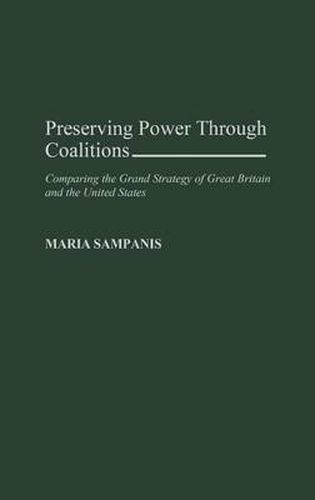Readings Newsletter
Become a Readings Member to make your shopping experience even easier.
Sign in or sign up for free!
You’re not far away from qualifying for FREE standard shipping within Australia
You’ve qualified for FREE standard shipping within Australia
The cart is loading…






Sampanis argues that the United States uses agricultural trade liberalization as a bonding issue with middle and weak countries, that the US then uses this relationship to improve its bargaining position with its challengers, that the US uses this relationship to enhance its competitiveness vis-a-vis its challengers, and that the US also uses this relationship to improve its access into middle and weak countries. Sampanis also shows that Britain before it also used negotiated arrangements with weaker states to gain bargaining power and improve competitiveness with challengers.
What do you do if-after years of doing what you want, getting others to do what you want, and essentially calling the shots-you can no longer simply do what you wish, convince others to do as you prefer, and dictate agendas? Sampanis examines through the lens of agricultural policy this dilemma faced by hegemons in decline, those once preeminent states whose dominance is gradually eroded by the very successes they encouraged.
As a self-preservation measure the United States-and Great Britain before it-negotiated arrangements with weaker states to gain bargaining power with challengers. Forming a coalition with those previously ignored, these declining hegemons maneuvered survival. Britain transformed its empire into a commonwealth; it used trade incentives to curry continued allegiance. In a significant policy shift, the United States seeks common ground with middle and weak states to rejuvenate its economic competitiveness in those economies as well as in those of its developed competitors. The tactice worked better for the United States, since a coalition of numbers translates into a coalition of votes in the institutional frameworks its hegemonic leadership fosters. As Sampanis shows, for both the United States and Great Britain, the prize has been an extended lease on influence.
$9.00 standard shipping within Australia
FREE standard shipping within Australia for orders over $100.00
Express & International shipping calculated at checkout
Sampanis argues that the United States uses agricultural trade liberalization as a bonding issue with middle and weak countries, that the US then uses this relationship to improve its bargaining position with its challengers, that the US uses this relationship to enhance its competitiveness vis-a-vis its challengers, and that the US also uses this relationship to improve its access into middle and weak countries. Sampanis also shows that Britain before it also used negotiated arrangements with weaker states to gain bargaining power and improve competitiveness with challengers.
What do you do if-after years of doing what you want, getting others to do what you want, and essentially calling the shots-you can no longer simply do what you wish, convince others to do as you prefer, and dictate agendas? Sampanis examines through the lens of agricultural policy this dilemma faced by hegemons in decline, those once preeminent states whose dominance is gradually eroded by the very successes they encouraged.
As a self-preservation measure the United States-and Great Britain before it-negotiated arrangements with weaker states to gain bargaining power with challengers. Forming a coalition with those previously ignored, these declining hegemons maneuvered survival. Britain transformed its empire into a commonwealth; it used trade incentives to curry continued allegiance. In a significant policy shift, the United States seeks common ground with middle and weak states to rejuvenate its economic competitiveness in those economies as well as in those of its developed competitors. The tactice worked better for the United States, since a coalition of numbers translates into a coalition of votes in the institutional frameworks its hegemonic leadership fosters. As Sampanis shows, for both the United States and Great Britain, the prize has been an extended lease on influence.